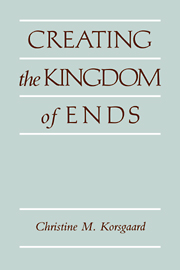Book contents
- Frontmatter
- Contents
- Introduction
- Abbreviations for Kant's works
- PART ONE KANT'S MORAL PHILOSOPHY
- 1 An introduction to the ethical, political, and religious thought of Kant
- 2 Kant's analysis of obligation: The argument of Groundwork I
- 3 Kant's Formula of Universal Law
- 4 Kant's Formula of Humanity
- 5 The right to lie: Kant on dealing with evil
- 6 Morality as freedom
- 7 Creating the Kingdom of Ends: Reciprocity and responsibility in personal relations
- PART TWO COMPARATIVE ESSAYS
- Bibliography
- Sources
- Other publications by the author
- Index
- Index of citations
4 - Kant's Formula of Humanity
Published online by Cambridge University Press: 05 June 2012
- Frontmatter
- Contents
- Introduction
- Abbreviations for Kant's works
- PART ONE KANT'S MORAL PHILOSOPHY
- 1 An introduction to the ethical, political, and religious thought of Kant
- 2 Kant's analysis of obligation: The argument of Groundwork I
- 3 Kant's Formula of Universal Law
- 4 Kant's Formula of Humanity
- 5 The right to lie: Kant on dealing with evil
- 6 Morality as freedom
- 7 Creating the Kingdom of Ends: Reciprocity and responsibility in personal relations
- PART TWO COMPARATIVE ESSAYS
- Bibliography
- Sources
- Other publications by the author
- Index
- Index of citations
Summary
INTRODUCTION
The Second Section of the Groundwork of the Metaphysics of Morals contains three arguments that have the form: if there were a categorical imperative, this is what it would have to be like. Each of these arguments leads to a new set of terms in which the categorical imperative can be formulated. In summarizing these arguments, Kant tells us that universality gives us the form of the moral law; rational nature or humanity as an end in itself gives us the material of the law; and autonomous legislation in a kingdom of ends represents a complete determination of maxims and a totality of ends. The Formula of the Universal Law is to be used in actual decision making, we are told; the other two, which bring the moral law “closer to intuition” and “nearer to feeling” can be used to “gain a hearing for the moral law” (G 436).
Attention to these remarks about the relations among the three formulas has perhaps obscured the fact that the three formulas represent a progression in the argument that leads from “popular moral philosophy” into “the metaphysics of morals.” I think that it is sometimes supposed that Kant's claim that the categorical imperative is a principle of reason rests squarely on the Formula of Universal Law – i.e., on that formula's “formality.” The claims of the other two formulas to be rational principles are then taken to be based upon their presumed equivalence to the Formula of Universal Law.
Information
- Type
- Chapter
- Information
- Creating the Kingdom of Ends , pp. 106 - 132Publisher: Cambridge University PressPrint publication year: 1996
Accessibility standard: Unknown
Why this information is here
This section outlines the accessibility features of this content - including support for screen readers, full keyboard navigation and high-contrast display options. This may not be relevant for you.Accessibility Information
- 56
- Cited by
